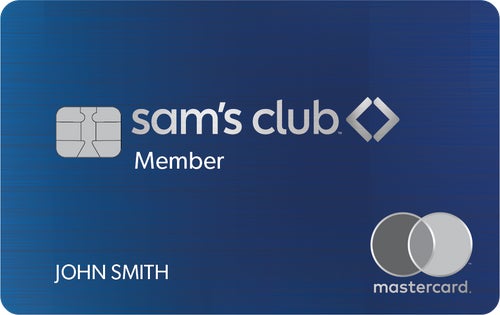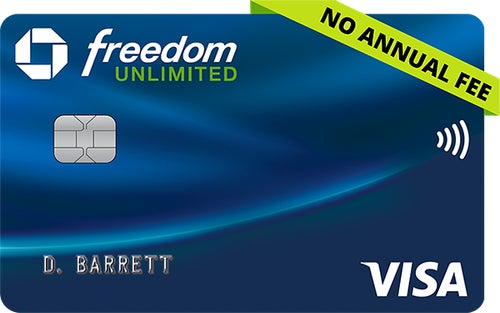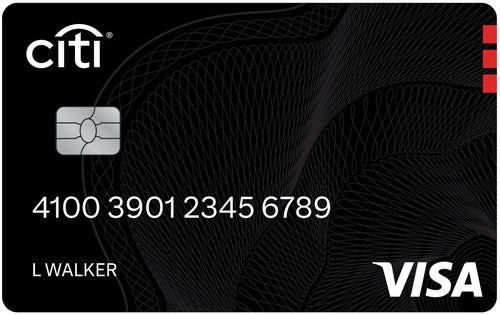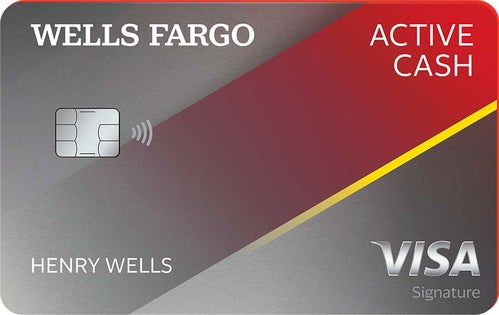| Cash Back Rating: | 2.9 / 5 |
| Rewards Value: | 3.0 |
| Annual Percentage Rate: | 3.0 |
| Rewards Flexibility: | 3.0 |
| Features: | 2.0 |
In a Nutshell:
With the exception of ample cash back at Sam’s Club gas stations, the Sam’s Club Mastercard is best reserved for making gas and dining purchases outside the warehouse club.
All information about the Sam’s Club Mastercard has been collected independently by CreditCards.com and has not been reviewed by the issuer.
Rewards Rate
|  |
Account opening offer $30 statement credit if you spend $30 in Sam’s Club purchases within 30 days of opening the account |  |
Annual Bonus |  |
Annual Fee |  |
Average Yearly Savings ($1,325 monthly spend) |  |
APR |  |
Rewards Redemption Pros
Cons
|  |
Other Notable Features: No foreign transaction fees, special financing deals (beware deferred interest), $0 fraud liability, identity theft protection, EMV chip, doubles as your membership card
The Sam’s Club Mastercard, issued by Synchrony Bank, should be at the top of your list if you’re a frequent Sam’s Club shopper or you’re someone who commutes to work. This card offers an exemplary rewards rate on gas and dining, and it even doubles as your membership card for ultimate convenience.
However, there are several earning caps to be aware of that limit this card’s overall value. Plus, you’ll only earn a great rate on Sam’s Club purchases if you’re a Sam’s Club Plus member.
Read on to learn how the Sam’s Club Mastercard doles out rewards, where its weaknesses are and who it’s best for.
Earning rewards
The Sam’s Club Mastercard comes with some very rewarding bonus categories that can apply to almost anyone. For example, cardholders earn 5% back on up to $6,000 in gas purchases each year (then 1% back) anywhere Mastercard is accepted. If someone is able to max out this benefit with $500 in gas purchases each month, they would earn $300 in cash back in this category alone every year.
All cardholders also earn 3% back on dining purchases, including takeout.
Cardholders who are also Sam’s Club Plus Members earn 5% back total on Sam’s Club purchases (3% for paying with the card and another 2% as a Plus member), including items bought at SamsClub.com. If you’re a regular Sam’s Club member, however, you’ll only earn 1% back on Sam’s Club purchases and other items you buy. Considering this card is a co-branded card with Sam’s Club, the 1% earning rate on Sam’s Club purchases for regular members is definitely subpar.
Also note that some restrictions apply. In addition to the earning cap on gas purchases, the fine print for the Sam’s Club Mastercard also says your cash back rewards are capped at $5,000 per year. That’s a huge threshold to meet, but it’s still worth noting if you spend a lot of money and have a high cash back potential as a result.
Spending example
Let’s say you buy gas and groceries at Sam’s Club, and that you spend around what the average family spends. According to the U.S. Bureau of Labor Statistics, the average family spent approximately $2,094 on gasoline per year at last count. Meanwhile, the United States Department of Agriculture (USDA) estimates that the average family of four on a moderate budget spends up to $1,128.20 per month on groceries.
With these levels of spending, you would earn this much in rewards on gas and Sam’s Club purchases as a Sam’s Club Plus member:
- Gas spending ($2,094 per year): $104.70 in cash back
- Grocery spending ($13,538.40 per year): $676.92 in cash back
If you’re a regular member, you would earn this much in rewards:
- Gas spending ($2,094 per year): $104.70 in cash back
- Grocery spending ($13,538.40 per year): $135.38 in cash back
Redeeming rewards
The Sam’s Club Mastercard comes with even more stipulations within its rewards program. For starters, you get your rewards from the prior year in February of each year, and your rewards are automatically added to your Sam’s Club account. From there, you can only redeem them for purchases or cash back at Sam’s Club locations.
While your rewards won’t expire as long as you’re a member and you use them before their expiration date, you won’t be able to redeem your rewards if you give up your Sam’s Club membership for any reason – for example, if you move and don’t even live near Sam’s Club anymore.
The fine print for this card goes on to say that, if your Sam’s Club membership ceases, “the rewards may not be redeemed until such membership is reactivated.”
How do rewards expiration dates work? Sam’s Club is pretty cryptic about this on their website.
Specifically, they say that “your unredeemed cash back rewards will expire as of the date listed on the reward notification you will receive when the cash back rewards are issued to your Sam’s Club membership. Any unredeemed cash back rewards will be forfeited upon the expiration date if unused.”
Current sign-up bonus
When you sign up for the Sam’s Club Mastercard, you get the chance to earn a statement credit of $30 when you open an account and make a Sam’s Club purchase of $30 within 30 days. We likely do not have to tell you that this “sign-up bonus” is pretty unimpressive and that most rewards cards offer much better bonus offers.
If you really want to earn a big bonus within the first few months of account opening, we suggest checking out our guide to the best credit card sign-up bonuses.
Card rates and fees
The Sam’s Club Mastercard doesn’t charge an annual fee, which is not that surprising. However, one benefit of this card is the fact that it doesn’t charge any foreign transaction fees.
Cardholders who carry a balance will pay a variable APR of 15.65% to 23.65% depending on their creditworthiness. Other fees to be aware of include a 4% balance transfer fee (minimum $10), a 3% cash advance fee (minimum $5) and a late fee of up to $40.
Card perks
The Sam’s Club Mastercard is pretty light on perks, which is pretty normal considering it’s a credit card for groceries and gas at heart. With that being said, there are some benefits you may actually care about:
- No foreign transaction fees: When traveling abroad, you won’t be charged a fee on foreign transactions.
- Doubles as membership card: You won’t have to carry a separate membership card since your Sam’s Club Mastercard is connected to your membership.
How does the Sam’s Club Mastercard compare to other cash back credit cards?
While the Sam’s Club Mastercard is co-branded with this bulk retail store, you can use any cash back credit card to shop here. To help you decide whether the Sam’s Club Mastercard is for you, we decided to compare it to other rewards credit cards for gas and groceries.
|
|
|
Rewards rate:
| Rewards rate:
| Rewards rate:
|
| Sign-up bonus: | Sign-up bonus:
| Sign-up bonus:
|
| Annual fee: $0 | Annual fee: $0 | Annual fee: $0 |
Other things to know:
| Other things to know:
| Other things to know:
|
Chase Freedom Unlimited®
As you compare these cards, it’s easy to see how the Chase Freedom Unlimited® stands out. There is a broader range of bonus categories including dining and drugstores, and all of your regular purchases will earn a flat 1.5% back. This card also offers a sign-up bonus, and there’s no annual fee to boot.
In addition to offering a breadth of insurance and travel protections, the Chase Freedom Unlimited also lets you redeem your rewards for cash back, statement credits, merchandise, gift cards and even travel.
Costco Anywhere Visa® Card by Citi
If you don’t have a big box membership yet and you may give Costco a try, you should also check out the Costco Anywhere Visa. This card also offers an excellent cash back rate on gas and EV charging purchases, but you’ll probably notice that it gives you 2% back on Costco and Costco.com purchases, compared to the 1% back Sam’s Club regular members get with their co-branded card.
On the other hand, the Costco Anywhere Visa also comes with similar restrictions on their rewards. You only get your rewards once per year, and they are only good at Costco.
Wells Fargo Active Cash Card
If you really want a flat-rate rewards card with fixed bonus categories and no earning caps, check out the Wells Fargo Active Cash Card. Not only do you get the chance to earn a $200 cash rewards bonus when you spend $500 in purchases within three months of account opening, but you earn a flat 2% cash rewards on purchases.
This card doesn’t charge an annual fee, and you get cellphone protection coverage when you pay your phone bill with your credit card.
Who should get the Sam’s Club Mastercard?
- Current Sam’s Club members who like to shop at bulk superstores
- Sam’s Club Plus members who can earn 5% total cash back on Sam’s Club purchases
- People who spend a lot on gas and dining out
- People are fine with earning rewards that have to be redeemed at Sam’s Club
How to use the Sam’s Club Mastercard:
- Keep your Sam’s Club membership current through at least February when you can spend your rewards balance from the previous year.
- Use the card to pay for gas and dining purchases to maximize your rewards.
- Carry the card with you when traveling overseas to take advantage of no foreign transaction fees.
- Pay your balance in full each month to avoid the high APR for purchases.
Is the Sam’s Club Mastercard worth it?
Since the Sam’s Club Mastercard offers cash back rewards with no annual fee, it’s hard to complain too much about it. Then again, there are rewards caps and limits with this card, and you can only redeem your rewards for cash back or merchandise by visiting Sam’s Club.
That makes the Sam’s Club Mastercard pretty inconvenient when you compare it to other cards with flexible rewards and fewer limitations. While the Sam’s Club Mastercard could be the best fit for your needs, we suggest comparing it to other cash back credit cards that offer bonus rewards on groceries, gas or both.
All reviews are prepared by CreditCards.com staff. Opinions expressed therein are solely those of the reviewer and have not been reviewed or approved by any advertiser. The information, including card rates and fees, presented in the review is accurate as of the date of the review. Check the data at the top of this page and the bank’s website for the most current information.
Responses to comments in the discussion section below are not provided, reviewed, approved, endorsed or commissioned by our financial partners. It is not our partner’s responsibility to ensure all posts or questions are answered.



